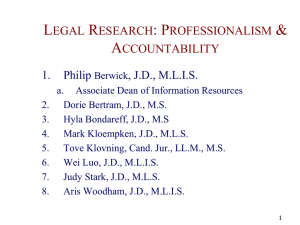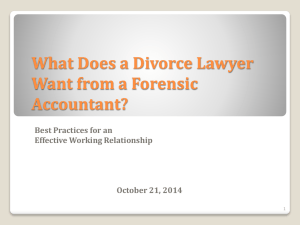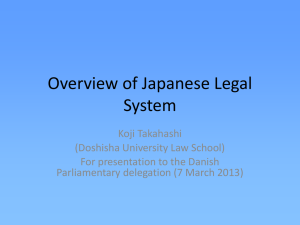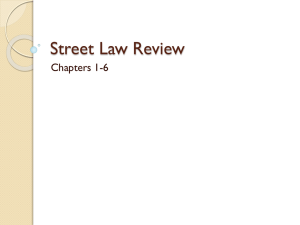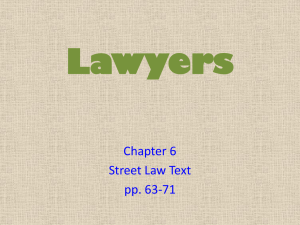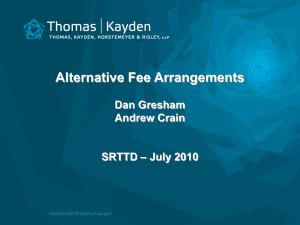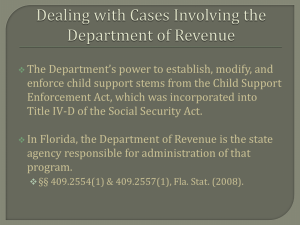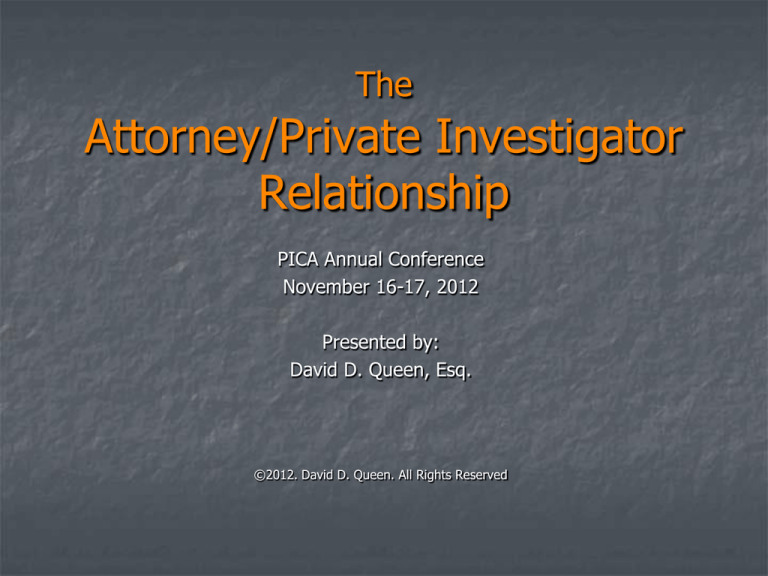
The
Attorney/Private Investigator
Relationship
PICA Annual Conference
November 16-17, 2012
Presented by:
David D. Queen, Esq.
©2012. David D. Queen. All Rights Reserved
To assume makes an ass of
you and me
Attorneys and PIs often make the mistake of
assuming the other one knows the law –
• the attorney wouldn’t ask me to do
something illegal, right?
• the PI has been doing this for years, so
he/she must know what they’re are allowed
to do and not do, right?
Vetting the attorney
Has he/she ever used a PI before? And
get some details
Who’s the attorney’s client?
Exactly what does the attorney want you
to do? (This will be your first hint the
attorney understands the legal limits)
Does the attorney have a standard PI
agreement?
And vice versa
A so-called attorney to the stars,
Terry Christensen was convicted of
illegal wiretapping actually
performed by notorious PI Tony
Pelicano. Christensen’s defense that
he didn’t realize Pelicano was
illegally wiretapping people to
collect evidence in a celebrity
divorce failed to carry the day.
The attorney, PI and client
PIs working for attorneys have a shared client. The PI
is not the attorney’s client but rather is the attorney’s
agent and therefore no privileged relationship exists
between the PI and the attorney. The attorney-client
relationship exists between the attorney and the
client and that attorney client privilege belongs
exclusively to the client, meaning he/she can assert it
or waive it without permission from either the
attorney or the PI. Put another way, the PI must
invoke but cannot waive the client’s attorney client
privilege
Important reminder …
Because the PI is not the attorney’s client,
the advice of counsel defense is not
available to the PI should the PI follow the
attorney’s legal advice and end up
violating the law. That advice might serve
as a good faith defense in a punitive
damages case. Therefore, the PI should
consider seeking independent legal advice
if concerned about the client’s attorney’s
legal opinions.
The attorney’s duty to the client:
“to maintain inviolate the confidence,
and at every peril to himself or
herself to preserve the secrets of his
or her client.”
Business & Professions Code §6068(e)
And the attorney is required to
invoke the privilege whenever the
opportunity arises unless expressly
instructed otherwise by the client.
Evidence Code §955
Compare that to the PI’s duty of
confidentiality
“Any licensee … may divulge to any law
enforcement officer or district attorney …
any information he or she may acquire as to
any criminal offense, but he or she shall not
divulge to any other person, except as he or
she may be required by law to do so, any
information acquired by him or her except
as directed by the employer or client for
whom the information was obtained.”
(emphasis added)
Business & Professions Code §7539(a)
Confidentiality & Client identity
A PI’s duty of client confidentiality does
not extend to the client’s identity.
“A plain reading of the statutory
language [§7539] demonstrates the
identity of the client does not fall within
its scope.”
Flynn v. Superior Court of San Diego County (1997) 57 Cal. App.
4th 990
[NOTE: neither privilege nor confidentiality is retroactive]
So how to assure the benefits of the
attorney/PI relationship?
In a written agreement which:
Identifies their common client;
Describes the services to be performed by the PI;
The purpose to which the information will be put;
Clarifies that the PI is working for the attorney on behalf of
the client;
Indicates if litigation is anticipated or even possible
(litigation privilege);
Specifies that the PI is cloaked with and duty bound to
protect the attorney-client relationship;
Identifies what steps the PI must take to preserve the
privilege (e.g. all relevant documents shall be appropriately
marked)
And the agreement should also include:
Identify who calls the shots;
Where invoices are to be sent;
Where (and when) PI’s reports are to be sent;
Warranties & disclaimers;
PI’s right to withhold reports if fees are not paid
(Business & Professions Code §624); and
PI’s right to withhold reports if client has lied
about intended use of the information or other
identified reasons
[Note: See the fee agreement checklist handout]
Fees …
California law requires a PI to provide
the client with “… a fee schedule or a
reasonable explanation of the method
by which charges … are to be
calculated.” The law is silent, however,
on whether it needs to be in writing.
16 Professional & Vocational Regulations §624.
Consider who signs!
A contract cannot be enforced against
a non-signing party. Therefore,
consider requiring the client to sign
along with attorney to : (a) improve
chances of fee collection; (b) get
verification of the scope and purpose
of your investigation; (c) bind the client
to your choice of laws and forum in the
event of litigation or arbitration.
Warranties
All attorney/PI agreements should include
mutual warranties. The PI warrants that
he/she will not employ illegal means or
methods in carrying out his/her services and
the attorney/client warrants that the reasons
for the engagement are truthful and
information obtained by the PI will be used
solely for lawful purposes (purpose should be
identified if feasible).
Disclaimers
All engagement letters should contain a
disclaimer that the investigator obtains
information from witnesses whose
veracity cannot be confirmed and from
data brokers, private and public
agencies, etc. which cannot be
independently verified and that any
reliance on the data is at the attorney’s
or client own risk.
Sample disclaimer
“The Agency sometimes uses the services of commercial
information data services, information from government
agencies, information provided by witnesses and other
private investigation agencies. This Agency endeavors to
verify the accuracy of information where feasible.
However, we, cannot guarantee the accuracy of
information which is provided to it by third parties. The
Client therefore understands and agrees to accept all
risk of reliance on such information.”
Include something similar in the initial agreement and repeat it in all
reports.
As Ronaldus Maximus (Ronald Reagan to nonbelievers) famously said of the Russians:
“Дᴏᴃҽяpй noh npoверяй”
(“Trust, but verify”)
In other words …
When asked to do a surveillance get a copy of vehicle
registrations if a tracker might be used;
When searching for a non-custodial kidnapping victim,
get a copy of the court custody order;
When dumspter diving confirm of the ownership of the
property where it’s located and public right of access;
Determine if medical privacy or trade secrets are
involved;
When shown a letter addressed to someone other than
the client, find out how it came into the attorney’s
possession (it’s a felony to intercept someone else’s
mail) and so on ….
If the attorney doesn’t know …
… tell him or her about the litigation
privilege.
“A privileged publication … or … broadcast
is one made … is one made … in any …
judicial proceeding … in any other official
proceeding authorized by law or … in the
initiation or course of any other proceeding
authorized by law …” (Note: “publication”
and “broadcast” have broad meanings)
Civil Code §47(b)
The privilege has been interpreted as having
four applications:
“ … to any communications (1) made in
judicial or quasi-judicial proceedings;
(2) by litigants or other participants
authorized by law; (3) to achieve the
objects of the litigation; and (4) that
have some connection or logical relation
to the action.” Silberg v. Anderson (1990) 50 Cal. App.
205, 212
Anticipation of litigation …
… extends to “preliminary
conversations and interviews between
a prospective witness and an attorney
[or the attorney’s agent] if they are in
some way related to or connected
with a pending or contemplated
action.” (Emphasis added)
Financial Corp. of America v. Wilburn (1987) 189 Ca. App. 3d 764777
That means …
… an investigator is protected from
charges of defamation even if the
statements are false (provided not
maliciously so), if made as part of litigation
including investigations in anticipation of
litigation. But to assure its availability, your
engagement contract should state that you
are being hired to assist the attorney in
possible future litigation. The privilege can
also apply to qualified PI services even
where an attorney is not involved.
The privilege can apply to:
“a constitutionally based privacy cause of
action.” Jacob B v. County of Shasta (2007) 40 Cal. 4th 948;
A wrongful imprisonment & false arrest
resulting from information provided to
police; or
Intentional infliction of emotional distress
And one more privilege point!
The privilege “…applies to … communication
concerning the job performance or
qualifications of an applicant for
employment, based upon credible evidence,
made without malice, by a current or former
employer of the applicant …” And also
“…authorizes a current or former employer,
or the employer’s agent, to answer whether
or not the employer would rehire a current
or former employer.”
Civil Code §47(c)
If an attorney asks you to interview a witness,
you should …
Find out if the case is civil or criminal;
Ask how the attorney got the witness’ name;
Make sure the “witness” is not really a
prospective, current or former juror;
Confirm the witness is not a victim or party to a
case;
Determine if the witness has counsel; and
Make sure there are no outstanding restraining
orders protecting that person (where indicated)
Criminal case witnesses
“No prosecuting attorney, attorney for the defendant,
or investigator for either … shall interview, question,
or speak to a victim or witness whose name has been
disclosed by the opposing party … without first clearly
identifying himself or herself, identifying the name of
the agency by who he or she is employed, and
identifying whether he or she represents, or has been
retained by, the prosecution or the defendant. If the
interview takes place in person, the party shall show
the victim or witness a business card, official badge,
or other form of identification before commencing the
interview or questioning.” (Emphasis added)
Penal Code §1054.8
Represented witnesses
The CA Code of Professional
Responsibility rule 2-100 prohibits
attorneys from directly contacting
witnesses represented by counsel at
the time of contact. And what an
attorney cannot do himself, he cannot
due through a surrogate (i.e. PI).
“Deceit” as witness tampering
Suggesting as fact something not true by
someone who does not believe it to be true;
Something as fact when there is reasonable
grounds to be believe it’s true;
Suppressing information you are duty bound to
disclose;
Suppressing facts which are like to mislead for
want of communicating the suppressed fact; or
Making a promise with no intent of performing
Civil Code §1710
PI Reports – when and how
“Investigative reports shall be submitted to
a customer at such times and in such
manner has been agreed upon between the
licensee and the customer. Upon demand
by the customer, the licensee shall not
refuse to divulge to the customer the
results of an investigation if payment has
been tendered for the charges levied.”
(Emphasis added)
Title 16 Professional & Vocational Regulations §624
Report content
A “false” report subjects the
investigator to discipline. Business &
Professions Code §7539(b). In
addition, the investigator “… shall
exercise due diligence in ascertaining
whether or not the facts and
information in the report are true and
correct.” §7539(c). In other words,
simple negligence can get you in
trouble.
Your report format should:
Be uniform in formatting;
Containing the appropriate header or footer
(confidential or privilege);
A disclaimer;
Cover a single subject (e.g. one witness
interview results);
Not include opinions or conclusions about
credibility, accuracy of information or legalities)
So protect yourself by …
A disclaimer in the fee agreement and every
report;
Written confirmation of your rights under §624;
But §624 requires you to invoice the client first
(assuming no retainer);
Including client’s agreement to withholding
information if he/she’s lied to the PI
Presented by:
David D. Queen, Esq.
225 S. Lake Ave. Suite 300
Pasadena, CA 91101
Tele: 626.689.2213
Fax: 626.628.3966
email: ddqueen@queenlaw.com
©2012. All rights reserved

